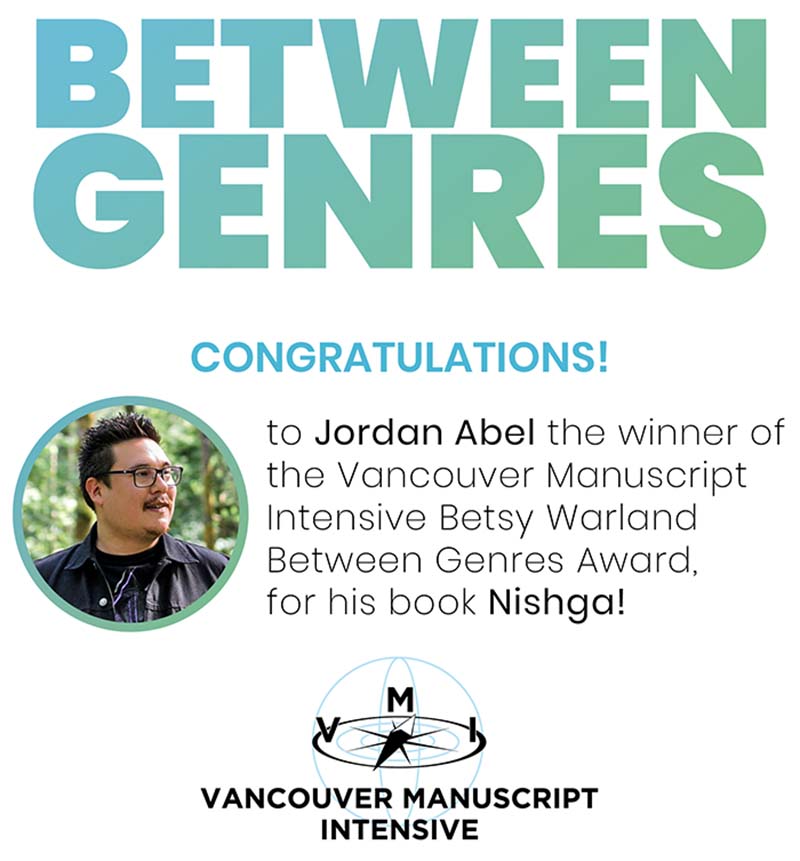
The Winner of the 2021 Award is Jordan Abel for his book NISHGA!
“Jordan Abel, through a variety of methods and procedures, produces in Nishga a heart-rending but also thought-provoking book about the intergenerational trauma caused by residential schools in Canada. This conceptual memoir is a book that will reward multiple readings, and it is a text I will return to again and again.”—Wayde Compton
Celebrating the 2021 shortlist
Jordan Abel, Nishga, Penguin Random House
Jordan Abel’s book Nishga is what I would call an exploded memoir of Indigenous identity, showing what can be done emotionally when non-fiction encompasses criticism, personal narrative, visual poetry, transcription, photography, and history.
Lindsay B.-e., The Cyborg Anthology, Brick Books
Lindsay B-e’s book The Cyborg Anthology is vast in its ambitions, a polyvocal text that speculates into existence a whole population of poets, and writes their verse as it evolves through the world the author has created.
Fanen Chiahemen, Never Make a Sound: A Memoir, The Awakened Press
Fanen Chiahemen’s Never Make a Sound is a coming-of-age text that is poetry and memoir and found text, and in this braided form echoes the way a subject under psychic pressure must make of themselves a unified person out of the many pieces of discourse and response.
At a ceremony at Vancouver Writers Fest on Sunday, October 24, 2021 with special guest of honour Betsy Warland in attendance, Wayde introduced the winner with these comments:
“Whenever I teach the concepts of form and genre, I always begin with the caveat that terms like fiction, poetry, memoir, speculative fiction, literary fiction, visual poetry, sound poetry, and so on ¾ these are all merely tools for talking about writing. They are not hard-edged boundaries, discrete and distinct from each other, as if ordained from above. When someone asks if a particular piece is a personal narrative essay or prose poetry, my answer is merely: “Yes.” Is this piece visual poetry or is it visual art? “Yes, it’s those things.” Conversation about what writing does is always more interesting than conversation about what writing is. And when form and genre are overemphasized, those writers who work within the overlapping parts of the Venn diagram can find themselves in fact in an institutional blind spot, where an arbitrary definition supercedes the value and genius of the writing itself. For this reason, I am so happy to see the creation of the VMI Betsy Warland Between Genres Award, so named after a writer whose own work is often located in the exciting terrain of mixture, recombination, and transcendant multiplicity. Thanks to Elee and Rachel, and thanks to Betsy, as always, for leading the way.”
Our congratulations and appreciation to all the authors whose works were submitted. The innovation and quality of the submissions was truly inspiring. We hope this award will encourage publishers and authors in creating future hybrid works
2021 Judge

Inaugural judge Wayde Compton has written five books and has edited two literary anthologies. His collection of short stories, The Outer Harbour, won the City of Vancouver Book Award in 2015 and he won a National Magazine Award for Fiction in 2011. His work has been a finalist for two other City of Vancouver Book Awards as well as the Dorothy Livesay Poetry Prize. In 2006 Compton co-founded Commodore Books, western Canada’s first Black Canadian literary press. Compton has been writer-in-residence at Simon Fraser University, Green College at the University of British Columbia, and the Vancouver Public Library. From 2012-18, he administrated the Creative Writing Program in Continuing Studies at SFU, including the award-winning Writer’s Studio. His latest book, The Blue Road, a fantasy graphic novel for young adults, illustrated by April dela Noche Milne, was called a “touching allegory of the unexpected and burdensome trials of migration” in a starred Kirkus review. Compton is currently the chair of Creative Writing at Douglas College in New Westminster, BC.
